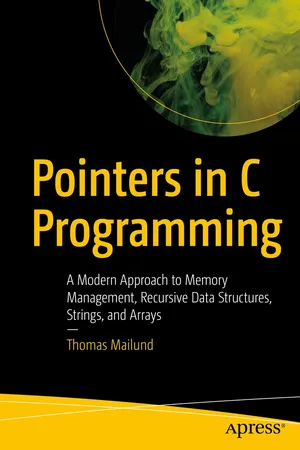
Pointers in C Programming
A Modern Approach to Memory Management, Recursive Data Structures, Strings, and Arrays
- English
- ePUB (mobile friendly)
- Available on iOS & Android
Pointers in C Programming
A Modern Approach to Memory Management, Recursive Data Structures, Strings, and Arrays
About this book
Gain a better understanding of pointers, from the basics of how pointers function at the machine level, to using them for a variety of common and advanced scenarios. This short contemporary guide book on pointers in C programming provides a resource for professionals and advanced students needing in-depth hands-on coverage of pointer basics and advanced features. It includes the latest versions of the C language, C20, C17, and C14.
You'll see how pointers are used to provide vital C features, such as strings, arrays, higher-order functions and polymorphic data structures. Along the way, you'll cover how pointers can optimize a program to run faster or use less memory than it would otherwise.
There are plenty of code examples in the book to emulate and adapt to meet your specific needs.
What You Will Learn
- Work effectively with pointers in your C programming
- Learn how to effectively manage dynamic memory
- Program with strings and arrays
- Create recursive data structures
- Implement function pointers
Who This Book Is For
Intermediate to advanced level professional programmers, software developers, and advanced students or researchers.Prior experience with C programming is expected.
Tools to learn more effectively

Saving Books

Keyword Search

Annotating Text

Listen to it instead
Information
Table of contents
- Cover
- Front Matter
- 1. Introduction
- 2. Memory, Objects, and Addresses
- 3. Pointers
- 4. Pointers and Types
- 5. Arrays
- 6. Working with Arrays
- 7. Strings
- 8. Substrings Through Ranges
- 9. Dynamic Memory Management
- 10. Generic Dynamic Arrays
- 11. Linked Lists
- 12. Search Trees
- 13. Function Pointers
- 14. Generic Lists and Trees
- 15. Reference Counting Garbage Collection
- 16. Allocation Pools
- 17. Conclusions
- Back Matter
Frequently asked questions
- Essential is ideal for learners and professionals who enjoy exploring a wide range of subjects. Access the Essential Library with 800,000+ trusted titles and best-sellers across business, personal growth, and the humanities. Includes unlimited reading time and Standard Read Aloud voice.
- Complete: Perfect for advanced learners and researchers needing full, unrestricted access. Unlock 1.4M+ books across hundreds of subjects, including academic and specialized titles. The Complete Plan also includes advanced features like Premium Read Aloud and Research Assistant.
Please note we cannot support devices running on iOS 13 and Android 7 or earlier. Learn more about using the app